taking leave
Think with the heart – conductor Haitink is dead
The Dutch conductor Bernard Haitink is dead. Photo: Hermann Wöstmann / dpa
© dpa-infocom GmbH
Bernard Haitink was a world star – against his will. For 65 years he delighted music lovers all over the world. His great passion was Bruckner and Mahler.
When the last note faded and Bernard Haitink lowered his baton, the audience at the Amsterdam Concertgebouw rose to give the master a final big ovation.
The applause lasted eight minutes and six seconds – an eternity for the more sober Dutch. And it would have taken even longer if Haitink hadn’t stopped the applause with a firm, clear wave of his hand. Now the great and beloved conductor died in London at the age of 92.
With a big bow, the Amsterdam audience said goodbye to their beloved conductor in June 2019. For more than 60 years he had been closely associated with the Royal Concertgebouw Orchestra. His world career officially came to an end with the last concert on September 6, 2019 in Lucerne, Switzerland.
Farewell had not been easy for him. At first he had only announced a break. But a little later he put an end to the speculation: “I’m 90”, he told the newspaper “de Volkskrant” in June 2019. “When I say I’m taking a sabbatical, it’s because I don’t want to say: I stop. I don’t feel like doing all the official parting, but the fact is that I won’t be conducting anymore. ” Farewell hurts, he admitted. But as a sober Amsterdam native, he kept his feelings to himself. “When I shed a tear, I do it privately.”
In 1956 Haitink conducted the Concertgebouw Orchestra for the first time. He was 27 years old and stepped in at short notice. He was so young that – it is said to this day – a woman in the audience hissed: “What a baby”. After all, the “baby” made such an impression that Haitink was appointed chief conductor of the orchestra just five years later.
“It was hell,” he would say later. The young conductor had to assert himself against an encrusted structure and not very flexible older musicians. After all, he was to be the boss in Amsterdam for almost three decades. In the end, he was made an honorary conductor, even if the relationship was not without tension.
Haitink never wanted to be a superstar at the desk. An orchestra has to be motivated and inspired. He wasn’t a demigod in a tailcoat – quite the opposite. “I’m a little shy,” he once said. He is not a power man, he says in one of his last interviews, that actually makes him an “anti-conductor”.
Haitink was known for his doubts, but never showed them on the desk. He did not approach a piece as an omniscient. “Conducting shouldn’t be too easy,” he said. He always worked on new pieces – even when it came to his favorite composers such as Bruckner, Mahler, Brahms or Shostakovich. He combined intellect and feeling in a very unique way. “You have to think with your heart and feel with your head,” he once told the “NRC Handelsblad”.
Haitink grew up in Amsterdam with the music of Mahler and Bruckner. He first heard Bruckner’s Seventh Symphony as a child, he recalled. “Perhaps it is abnormal for an eight-year-old to be drawn so much to a long stretch, but it was.” This particular passion should not leave him, he was still surprised in June 2019. “I am absolutely not religious, but Bruckner’s music is exactly that. It’s one of the riddles of my life. “
After leaving Amsterdam in 1988, Haitink directed the Royal Opera in London for 14 years. He was also musical director of the Glyndebourne Opera Festival, chief conductor of the London Philharmonic Orchestra, the Staatskapelle Dresden and the Chicago Symphony Orchestra. He was an honorary member of the Berlin Philharmonic and the Chamber Orchestra of Europe. And his guest appearances were innumerable.
A fall on the podium in Amsterdam in 2018 marked the end of his career. Conducting, he admitted, required more and more strength. But he could hardly imagine anything else. “Life without conducting would be miserable.”

